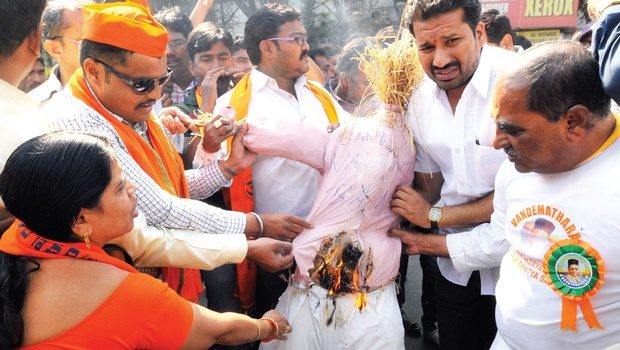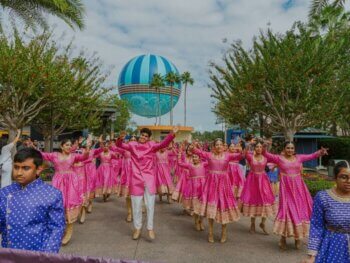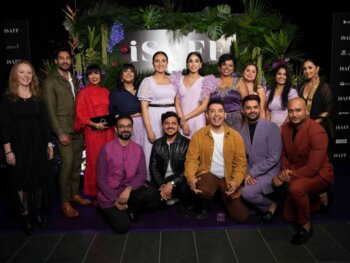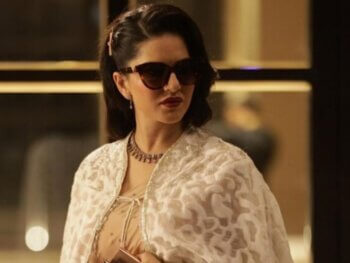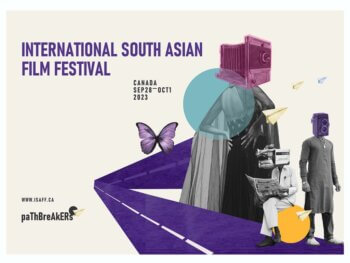February's Day Of Love Drew Attention To The Struggle In India Over The Balance Between Modern Ideas And Traditional Beliefs
This year was the first time I got to celebrate Valentine’s Day. Being born in India and have lived outside of the country for the majority of my life, I must confess this was one of my most memorable days. Unfortunately, for many couples in India, the day was not so peaceful.
Earlier in February, Akhil Bharat Hindu Mahasabha (ABHM) had declared that it would marry off any couples who decided to show public affection. Chandra Prakash Kaushik, the group’s national president, declared, “Display of love in the entire Valentine’s week is equivalent to not following Indian traditions. Anyone found displaying love on Facebook, Twitter or WhatsApp will be caught hold of.” The organization was determined in its cause, but the Mumbai chapter decided not to participate or engage in any violent act or protest on that day. However, violence towards couples did occur elsewhere in the country.
According to the Times of India, 50 right-wing Hindu groups and Bajrang Dal activists marched on the beautiful city of Lucknow to prey on couples. The group patrolled the City of Kanpur on their bikes, waving flags, shouting anti-Valentine’s Day slogans and targeting any unguarded couples. One activist said, “The youth wing of the party deems Valentine's Day a vulgar occasion. It is wrong to indulge in these acts. We want to send out a message to the youth to not indulge in such activities, which threaten Indian culture and society and also Hindu traditions.”
While men were slapped, girls were severely humiliated by these so-called moral police. At Begum Hazrat Mahal Park, the group particularly targeted Muslim boys with Hindu girls, caning them. This violence was not just present in Lucknow but also spread across various parts of Uttar Pradesh in cities like Kanpur, Jhansi and Gorakhpur. The moral policing came from various Hindu extremist groups, including Bajrang Dal, Shiv Sena and Hindu Mahasabha.
Many activists were arrested and held accountable for the breach of the peace in Lucknow. Surprisingly, there was no activity in other major cities like Delhi and Mumbai, where police made sure security was high in order to avoid protests and violence on this day. Protests also took place in other cities in India, including Bangalore and Hyderabad. Over 200 activists were arrested in Hyderabad for burning effigies during their protests.
Police were vigilant and able to avoid violence in the respective cities. Many students at Osmania University who were pro-Valentine’s Day also took to the streets, according to the New Indian Express, bearing the slogan "Indian lovers unite!" and taking part in cultural activities.
What is amazing to see is that I belong to a country where even a day to celebrate love becomes a political act. As India enters the 21st century, the fear that its “essential” traditional culture will be eroded and destroyed remains in many hearts — especially the right-wing Hindu activists who are willing to take any measures to protect their culture.
While I do not agree with these activists' methods, I do agree that many of us — especially in this age of globalization and cosmopolitanism — fear that we will lose our traditions and cultures. Valentine’s Day is seen as a product of “foreign Western culture,” as Bajrang Dal activists observed. These protests and altercations on Valentine’s Day are evidence of the tensions that remain in India as Indians struggle between maintaining our traditional Indian values and simultaneously adopting many Western values and customs as part of our daily lives. There is also a fear that because of capitalism and globalization, Indians will lose these values.
What I find most disconcerting is that there are so many contradictions in popular culture. This is especially true in India, where recent films illustrate women as strong, independent, and socially and sexually bold — for example, Deepika Padukone, Katrina Kaif and Alia Bhatt. Yet, at the same time, on the ground (and I would argue in Indian soap operas), we see that there is a strong moral policing through Hindu “traditional” values, which have been shaped both by our religion and our home.
The violence and unrest all over India on Valentine’s Day speak volumes about the tensions between modern ideas and traditional thinking — tensions that may never resolve.
Feature Image: The New Indian Express
Nidhi Shrivastava
Author
Nidhi Shrivastava (@shnidhi) is a Ph.D. candidate in the English department at Western University and works as an adjunct professor in at Sacred Heart University. She holds double masters in South Asian Studies and Women's Studies. Her research focuses on Hindi film cinema, censorship, the figure o...


















































